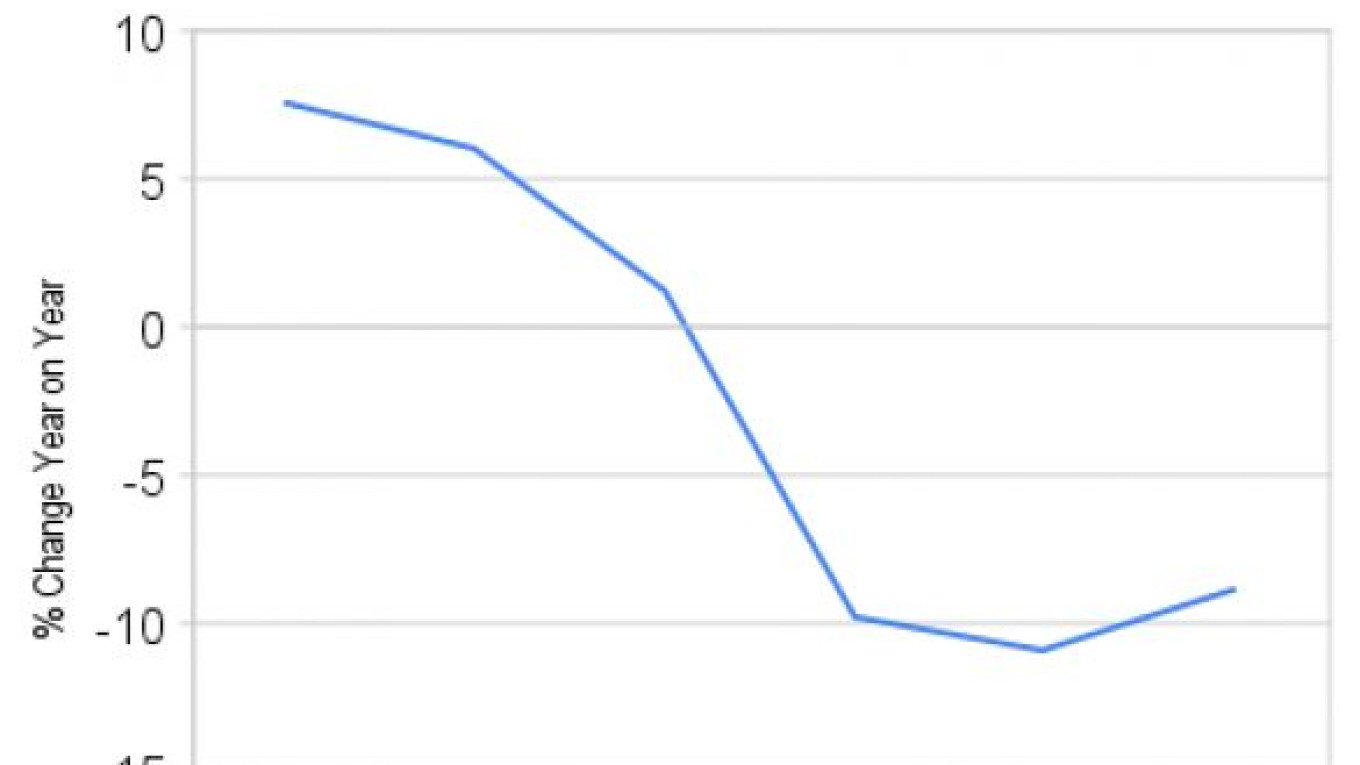Russia’s economic decline eased last quarter from a record slump in the previous three months as oil, gas and metals prices rebounded and stimulus measures helped offset the impact of the global recession, the State Statistics Service said Thursday.
The country’s output shrank 8.9 percent in the third quarter from a year earlier, after contracting a record 10.9 percent in the previous period, the service said in a preliminary estimate on its web site. From the second quarter, output grew a nonseasonally adjusted 13.9 percent. The office didn’t give a breakdown of the figures.
“It’s good growth, but it’s caused by the inventory cycle and the recovery of external demand for Russian products, primarily gas and metals,” said Maxim Oreshkin, head of research at Rosbank. “For growth to continue you need end-consumer demand to recover and investment demand to recover. So far there has been no clear recovery in these sectors.”
This year’s 80 percent rebound in the price of Urals crude is pushing the country to recovery even as President Dmitry Medvedev calls for an end to its “humiliating” reliance on commodities. The economy may grow 3.2 percent in 2010 after slumping 8.7 percent this year, the World Bank said Nov. 10, marking a bigger turnaround than Russia achieved after its 1998 debt default and devaluation.
Oil prices in excess of government estimates will help narrow this year’s budget deficit to 7.5 percent of GDP from an earlier forecast of 8.3 percent, Finance Minister Alexei Kudrin said Oct. 21, enabling the government to maintain the stimulus. Its 2010 budget deficit outlook assumes that crude will average $58 a barrel and rise to $60 in 2012.
Rising oil prices have also helped exports recover with sales abroad up 7.6 percent in September from August. From a year earlier, exports are down 33 percent, according to Central Bank data.
“We doubt that Russia’s GDP will resume growth without a continuing rise in exports,” Orlova said in the report. “Until the lack of investment is addressed, we believe there is a high risk that output will remain stagnant.”
While higher raw material prices have helped commodity exporters and bolstered state finances, companies have lacked funding to invest in continued growth.
Rate cuts have so far failed to revive bank lending, hindering companies’ efforts to stay afloat.
Though oil price gains are helping the economy now, even as banks limit credit, Russia’s failure to diversify threatens its prospects of sustainable growth.
Medvedev in his state-of-the-nation address Thursday also renewed his demand for an end to the dependence on commodities.
A Message from The Moscow Times:
Dear readers,
We are facing unprecedented challenges. Russia's Prosecutor General's Office has designated The Moscow Times as an "undesirable" organization, criminalizing our work and putting our staff at risk of prosecution. This follows our earlier unjust labeling as a "foreign agent."
These actions are direct attempts to silence independent journalism in Russia. The authorities claim our work "discredits the decisions of the Russian leadership." We see things differently: we strive to provide accurate, unbiased reporting on Russia.
We, the journalists of The Moscow Times, refuse to be silenced. But to continue our work, we need your help.
Your support, no matter how small, makes a world of difference. If you can, please support us monthly starting from just $2. It's quick to set up, and every contribution makes a significant impact.
By supporting The Moscow Times, you're defending open, independent journalism in the face of repression. Thank you for standing with us.
Remind me later.


